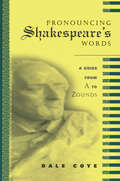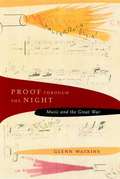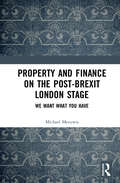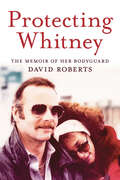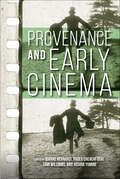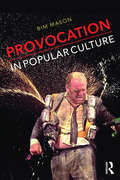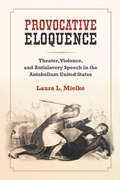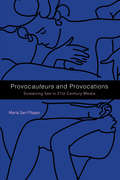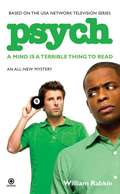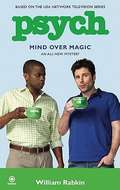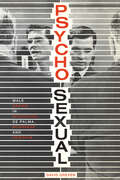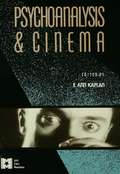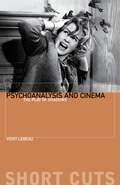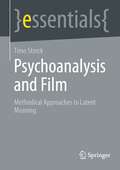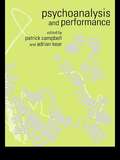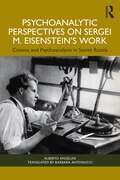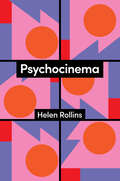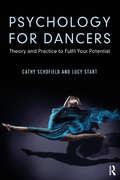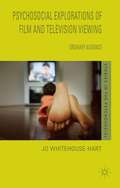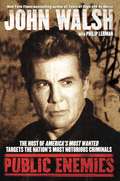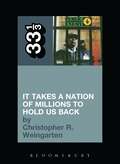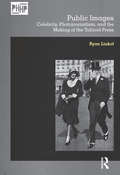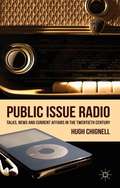- Table View
- List View
Pronouncing Shakespeare's Words
by Dale CoyeHow do you pronounce zounds, Milan, housewife and hundreds of other words in Shakespeare's plays? In this ingenious book, Dale Coye has provided a guide to each significant word, line-by line, scene-by-scene, in twenty of Shakespeare's most popular plays. More than a simple pronouncing dictionary, Pronouncing Shakespeare's Words pays attention to scansion, displays alternative pronunciations in different centuries and geographical areas, and provides a simple pronunciation guide requiring no knowledge of lexicographic symbols. Now available in an affordable paperback edition, Pronouncing Shakespeare's Plays will become a vade mecum (pronounced VAH-day MAY-cum) for actors, students, and general readers of Shakespeare.
Pronouncing Shakespeare's Words: A Guide From A To Zounds
by Dale CoyeFirst published in 2003. Routledge is an imprint of Taylor & Francis, an informa company.
Proof through the Night: Music and the Great War
by Glenn WatkinsWatkins investigates the variable roles of music primarily from the angle of the Entente nations' perceived threat of German hegemony in matters of intellectual and artistic accomplishment--a principal concern not only for Europe but also for the United States, whose late entrance into the fray prompted a renewed interest in defining America as an emergent world power as well as a fledgling musical culture.
Property and Finance on the Post-Brexit London Stage: We Want What You Have
by Michael MeeuwisA guide to the contemporary London stage as well as an argument about its future, the book walks readers through the city’s performance spaces following the Brexit vote. Austerity-era London theatre is suffused with the belief that private ownership defines full citizenship, its perspective narrowing to what an affluent audience might find relatable. From pub theatres to the National, Michael Meeuwis reveals how what gets put on in London interacts with the daily life of the neighbourhoods in which they are set. This study addresses global theatregoers, as well as students and scholars across theatre and performance studies—particularly those interested in UK culture after Brexit, urban geography, class, and theatrical economics.
Protecting Whitney: The Memoir of Her Bodyguard
by David RobertsDavid Roberts was Whitney Houston's bodyguard, the real one. Roberts was hired in 1988 for Houston's UK portion of the Moment of Truth world tour. Accustomed to working for diplomats and Fortune 500 clients, Roberts had reservations about working with a pop star. But Houston's heart of gold won him over from the moment they met at Heathrow airport. There's a high bar for those who work in this business: you must be willing to die for your boss. Houston made that easy. Roberts got to travel the globe with one of the most fun-loving and generous souls he'd ever met. His memoir reveals heartwarming anecdotes of life with one of the world's most recognizable stars, including privately shared moments such as the birth of Bobbi Kristina. But there are also shocking and heartbreaking revelations. Roberts was present for some of Houston's most challenging ordeals. And he was helpless as he watched those who claimed to love and support her look the other way because they saw her voice box as a cash machine. His heart was ultimately shattered as he witnessed her succumb to the one threat he could not protect her from: herself.
Provenance and Early Cinema (Early Cinema in Review: Proceedings of Domitor)
by Joanne Bernardi, Paolo Cherchi Usai, Tami Williams and Joshua YumibeRemnants of early films often have a story to tell. As material artifacts, these film fragments are central to cinema history, perhaps more than ever in our digital age of easy copying and sharing. If a digital copy is previewed before preservation or is shared with a researcher outside the purview of a film archive, knowledge about how the artifact was collected, circulated, and repurposed threatens to become obscured. When the question of origin is overlooked, the story can be lost. Concerned contributors in Provenance and Early Cinema challenge scholars digging through film archives to ask, "How did these moving images get here for me to see them?" This volume, which features the conference proceedings from Domitor, the International Society for the Study of Early Cinema, 2018, questions preservation, attribution, and patterns of reuse in order to explore singular artifacts with long and circuitous lives.
Provocation in Popular Culture
by Bim MasonWhat role can provocation play in the process of renewal, both of individuals and of societies? Provocation in Popular Culture is an investigation into the practice of specific provocateurs and the wider nature of cultural provocation, examining, among others: Banksy Sacha Baron Cohen Leo Bassi Pussy Riot Philippe Petit Archaos. Drawing on Bim Mason’s own twenty-five year career as performer, teacher and creative director, this book explores the power negotiations involved in the relationship between provocateur and provoked, and the implications of maintaining a position on the ‘edge’. Using neuroscience as a bridge, it proposes a similarity between complexity theory and cultural theories of play and risk. Three inter-related analogies for the ‘edge’ on which these performers operate – the fulcrum, the blade and the border – reveal the shifts between structure and fluidity, and the ways in which these can combine in a single moment.
Provocative Eloquence: Theater, Violence, and Antislavery Speech in the Antebellum United States
by Laura L MielkeIn the mid-19th century, rhetoric surrounding slavery was permeated by violence. Slavery’s defenders often used brute force to suppress opponents, and even those abolitionists dedicated to pacifism drew upon visions of widespread destruction. Provocative Eloquence recounts how the theater, long an arena for heightened eloquence and physical contest, proved terribly relevant in the lead up to the Civil War. As antislavery speech and open conflict intertwined, the nation became a stage. The book brings together notions of intertextuality and interperformativity to understand how the confluence of oratorical and theatrical practices in the antebellum period reflected the conflict over slavery and deeply influenced the language that barely contained that conflict. The book draws on a wide range of work in performance studies, theater history, black performance theory, oratorical studies, and literature and law to provide a new narrative of the interaction of oratorical, theatrical, and literary histories of the nineteenth-century U.S.
Provocative Plastics: Their Value in Design and Material Culture
by Susan LambertPlastics have now been our most used materials for over fifty years. This book adopts a new approach, exploring plastics’ contribution from two perspectives: as a medium for making and their value in societal use. The first approach examines the multivalent nature of plastics materiality and their impact on creativity through the work of artists, designers and manufacturers. The second perspective explores attitudes to plastics and the different value systems applied to them through current research undertaken by design, materials and socio-cultural historians. The book addresses the environmental impact of plastics and elucidates the ways in which they can and must be part of the solution. The individual viewpoints are provocative and controversial but together they present a balanced and scholarly un-picking of the debate that surrounds this ubiquitous group of materials. The book is essential reading for a wide academic readership interested in the Arts and Humanities, especially Design and Design History; Anthropology; and Cultural, Material and Social Histories.
Provocauteurs and Provocations: Screening Sex in 21st Century Media
by Maria San FilippoTwenty-first century media has increasingly turned to provocative sexual content to generate buzz and stand out within a glut of programming. New distribution technologies enable and amplify these provocations, and encourage the branding of media creators as "provocauteurs" known for challenging sexual conventions and representational norms.While such strategies may at times be no more than a profitable lure, the most probing and powerful instances of sexual provocation serve to illuminate, question, and transform our understanding of sex and sexuality. In Provocauteurs and Provocations, award-winning author Maria San Filippo looks at the provocative in films, television series, web series and videos, entertainment industry publicity materials, and social media discourses and explores its potential to create alternative, even radical ways of screening sex. Throughout this edgy volume, San Filippo reassesses troubling texts and divisive figures, examining controversial strategies—from "real sex" scenes to scandalous marketing campaigns to full-frontal nudity—to reveal the critical role that sexual provocation plays as an authorial signature and promotional strategy within the contemporary media landscape.
Psych: A Mind Is a Terrible Thing to Read
by William RabkinTrained to be a detective by his father, blessed with astounding powers of observation and deduction, and cursed with a refusal to take anything seriously, Shaw Spencer has convinced everyone he's psychic. Now, with his best friend, Gus, he's either going to clean up . . . or be found out. With eighty-seven parking tickets to their credit, it doesn't take a psychic to predict what happens when Shawn and Gus go to pick up Gus's impounded car: They get busted. Shawn is convinced they've stumbled across a criminal conspiracy, but Gus just wants to get away intact. Unfortunately, the fleeing Gus is run over by a speeding Mercedes. When he wakes up in the hospital, things have gotten even worse. Because while Gus was unconscious, Shawn picked up a new sidekick: Tara Larison, a beautiful woman who insists she's Shawn's psychic slave . . . and who won't leave them alone until she's fulfilled every one of Shawn's desires. But when Shawn's enemies start turning up dead, the pair must figure out if it's the work of the criminal conspiracy they've discovered--or Shawn's subconscious, sending his new minion out to do his dirty work.
Psych: Mind Over Magic
by William RabkinBased on the hit usa network series Shawn Spencer has convinced everyone he's psychic. Now, he's either going to clean up- or be found out. Murder and Magic are all in the mind... <P><P>When a case takes Shawn and Gus into an exclusive club for professional magicians, they're treated to a private show by the hottest act on the Vegas Strip, "Martian Magician" P'tol P'kah. But when the wizard seemingly dissolves in a tank of water, he never rematerializes. And in his place there's a corpse in a three piece suit and a bowler hat. Eager to keep his golden boy untarnished, the magician's manager hires Shawn and Gus to uncover the identity of the dead man and find out what happened to P'tol P'kah. But to do so, the pair will have to pose as a new mentalist act, and go undercover in a world populated by magicians, mystics, Martians-and one murderer...
Psycho-Sexual: Male Desire in Hitchcock, De Palma, Scorsese, and Friedkin
by David GrevenBridging landmark territory in film studies, Psycho-Sexual is the first book to apply Alfred Hitchcock’s legacy to three key directors of 1970s Hollywood—Brian De Palma, Martin Scorsese, and William Friedkin—whose work suggests the pornographic male gaze that emerged in Hitchcock’s depiction of the voyeuristic, homoerotically inclined American man. Combining queer theory with a psychoanalytic perspective, David Greven begins with a reconsideration of Psycho and the 1956 remake of The Man Who Knew Too Much to introduce the filmmaker’s evolutionary development of American masculinity. Psycho-Sexual probes De Palma’s early Vietnam War draft-dodger comedies as well as his film Dressed to Kill, along with Scorsese’s Taxi Driver and Friedkin’s Cruising as reactions to and inventive elaborations upon Hitchcock’s gendered themes and aesthetic approaches. Greven demonstrates how the significant political achievement of these films arises from a deeply disturbing, violent, even sorrowful psychological and social context. Engaging with contemporary theories of pornography while establishing pornography’s emergence during the classical Hollywood era, Greven argues that New Hollywood filmmakers seized upon Hitchcock’s radical decentering of heterosexual male dominance. The resulting images of heterosexual male ambivalence allowed for an investment in same-sex desire; an aura of homophobia became informed by a fascination with the homoerotic. Psycho-Sexual also explores the broader gender crisis and disorganization that permeated the Cold War and New Hollywood eras, reimagining the defining premises of Hitchcock criticism.
Psychoanalysis and Cinema (AFI Film Readers)
by E. Ann KaplanThese fifteen carefully chosen essays by well-known scholars demonstrate the vitality and variety of psychoanalytic film criticism, as well as the crucial role feminist theory has played in its development. Among the films discussed are Duel in the Sun, The Best Years of Our Lives, Three Faces of Eve, Tender is the Night, Pandora's Box, Secrets of the Soul, and the works of Jacques Tourneur (director of The Cat People and other features).
Psychoanalysis and Cinema: The Play of Shadows (Short Cuts)
by Vicky LebeauLebeau examines the long and uneven history of developments in modern art, science, and technology that brought pychoanalysis and the cinema together towards the end of the nineteenth century. She explores the subsequent encounters between the two: the seductions of psychoanalysis and cinema as converging, though distinct, ways of talking about dream and desire, image and illusion, shock, and sexuality. Beginning with Freud's encounter with the spectacle of hysteria on display in fin-de-siècle Paris, this study offers a detailed reading of the texts and concepts which generated the field of psychoanalytic film theory.
Psychoanalysis and Film: Methodical Approaches to Latent Meaning (essentials)
by Timo StorckThis essential is dedicated to the connection between psychoanalysis and film. Psychoanalysis is suitable for a methodically guided film viewing. This is not an application of psychoanalytical theory, but rather an application of its method of a reflected relationship to a counterpart. In this way, latent meanings can be taken into consideration and an interpretation can be developed. This essential reconstructs the possibilities of such an approach and presents existing approaches. Finally, a guideline for carrying out a film psychoanalytical interpretation is proposed. Numerous film examples serve to illustrate this.The translation was done with the help of artificial intelligence. A subsequent human revision was done primarily in terms of content.
Psychoanalysis and Performance
by Adrian Kear Patrick CampbellThe field of literary studies has long recognised the centrality of psychoanalysis as a method for looking at texts in a new way. But rarely has the relationship between psychoanalysis and performance been mapped out, either in terms of analysing the nature of performance itself, or in terms of making sense of specific performance-related activities. In this volume some of the most distinguished thinkers in the field make this exciting new connection and offer original perspectives on a wide variety of topics, including: · hypnotism and hysteria · ventriloquism and the body · dance and sublimation · the unconscious and the rehearsal process · melancholia and the uncanny · cloning and theatrical mimesis · censorship and activist performance · theatre and social memory. The arguments advanced here are based on the dual principle that psychoanalysis can provide a productive framework for understanding the work of performance, and that performance itself can help to investigate the problematic of identity.
Psychoanalytic Perspectives on Sergei M. Eisenstein's Work: Cinema and Psychoanalysis in Soviet Russia
by Alberto AngeliniIn this insightful book, Alberto Angelini shows the influence of psychoanalysis and psychology on Sergei M. Eisenstein, one of the most celebrated Russian directors, and his cinematic output. Angelini situates Eisenstein’s life and oeuvre in the history and culture of twentieth-century Russia, drawing clear parallels between his networking with key figures such as Lev Vygotsky and Aleksandr Luria. He utilises the tools of psychology with the insight of psychoanalysis to illuminate the ways in which Eisenstein understood art as an anthropological enterprise while maintaining the same dialectical philosophy as the director in highlighting the many disciplines and figures that he drew inspiration from. Angelini also looks in depth at the influence psychoanalytic theories of regression had on Eisenstein’s approach to art, while examining the impact Stalinism had directly on both Eisenstein and psychoanalysis at large from the 1930s onwards. This book is an essential resource for psychoanalysts, students, and scholars of film studies, as well as those interested in the intersection between psychoanalytic theory, cinema, and the arts.
Psychocinema (Theory Redux)
by Helen RollinsPsychocinema reexamines the connection between psychoanalysis and film, arguing for a return to the universalist core of both cinema and subjectivity. It traces the history of the influence of psychoanalysis on cinema and shows how the detour into ideologies of identity and difference eclipses the premise of the first and the emancipatory power of the second.The book argues that psychoanalysis does not simply help us elucidate what we see on screen: rather, there is a fundamental relationship between the structure of psychoanalysis and that of cinema. Cinema acts upon the viewer like psychoanalysis upon the analysand and can expose them to the universal Lack inherent in their desire. This process undermines the unconscious logic of capitalism, which relies on a promise in fulfilment.Rollins, a filmmaker, shows how reductive interpretations of psychoanalytic film theory have permeated film education and film practice and have affected the way films are made and watched, to the detriment of contemporary philosophy and politics. Psychocinema urges filmmakers, theorists and audiences to embrace the truly radical and emancipatory potential of cinema: its capacity to confront us with the universal Lack in our desire.
Psychology for Dancers: Theory and Practice to Fulfil Your Potential
by Cathy Schofield Lucy StartPsychology for Dancers: Theory and Practice to Fulfil Your Potential examines how psychological theory can be related to dance practice. Aimed at the dancer who wants to maximize their potential but has no grounding in psychology, the book begins with an examination of basic psychological concepts, approaches and methods, before applying theory to dance. The book explores why dance is so important in many people’s lives: as a form of fitness, a profession, or visual entertainment. Each chapter then examines a different aspect of psychology related to dance in an applied context. Self-perception is examined as dancers are under great scrutiny; a grounded sense of self will ensure a positive perception of self-worth and body image, and suggestions are made as to how a healthy and motivational climate can be created. The book also places an emphasis on how cognitive skills are as important as technical skills, including the ability to learn and recall steps and choreography as efficiently as possible. Social factors are related to the dance context, with a discussion of effective leadership and communication skills and the importance of group cohesion. Finally, there is a review of the impact of emotions on dance practice and how best to manage these emotions. Each chapter reviews important psychological theories, offering practical suggestions on how they can be applied to dance practice. Psychology for Dancers is an invaluable resource for students, professionals, and teachers of dance.
Psychosocial Explorations of Film and Television Viewing
by Jo Whitehouse-HartMost people have, at some point in their lives, experienced powerful, often strange and disconcerting, responses to films and television programmes of which they cannot always make sense. Psychosocial Explorations of Film and Television Viewing takes as its subject the seemingly mundane and everyday activity of watching television and films in the home, arguing that the affective and emotional experiences generated for audiences make this activity in fact extraordinary. Based on a fascinating empirical study of audiences' "favourite" films and television programmes, the book unravels the biographical and emotional intensity of viewing, from a psychosocial perspective. Drawing on insights from psychoanalysis including the work of Sigmund Freud, Melanie Klein, Donald Winnicott, Wilfred Bion and Christopher Bollas, and sociological theorists such as Pierre Bourdieu, the book argues that viewing is a psychosocial activity which must consider the relationships and processes between "inner" and "outer" worlds. Important ideas from media audience research are revisited, to show that families and biographical experiences influence audience identification, interpretation and uses of television. The in-depth case studies show that whilst viewing can be pleasurable, in the conventional sense of enjoyment, it can also be anxiety-provoking and contradictory. Employing psychoanalytic methods for social and cultural research, this book is an important contribution to Media Studies, Film Studies, Cultural Studies and Psychosocial Studies.
Public Enemies: The Host of America's Most Wanted Targets the Nation's Most Notorious Criminals
by John Walsh Philip LermanThe host of America's Most Wanted, John Walsh has formed a vital partnership with the public, the media, and law enforcement that has led to the capture of hundreds of the worst serial killers, kidnappers, pedophiles, and rapists of our time. In Public Enemies he reveals the cost -- the blood, sweat, and tears -- behind the relentless pursuit of hard justice, in such infamous cases as: Kyle Bell: A lifelong sexual predator whose madness culminated in the slaying of an eleven-year-old North Dakota girl. Bell was one of the only fugitives AMW had to capture twice -- and his case stirred more outrage than any other broadcast in AMW's history. Kathleen Soliah: This accused Symbionese Liberation Army terrorist disappeared in 1969 only to resurface twenty-five years later as suburban housewife and soccer mom Sara Jane Olson. Her arrest, following AMW's profile of Soliah and her former SLA partner James Kilgore, incited a stunning controversy. Rafael Resendez-Ramirez: aka The Railroad Killer. A sociopathic drifter, he rode the Texas rails, stopping only to rape and kill. His case was first brought to the public eye by AMW, and it was a secret call to the program's hot line that ultimately led to his surrender. In those and other gripping true-crime profiles, John Walsh exposes the behind-the-scenes drama of the groundbreaking show, and what actually unfolds between the crimes and the captures -- the vital leads from strangers, the dangerous manhunts, the developments cut from the AMW broadcasts, and the dogged investigations by authorities. He divulges stunning lapses in the judicial process that release monsters to the streets time and again. He takes readers inside the hearts and souls of the grieving families, and gives eyewitness accounts of the dramatic final moments when fugitives are finally taken down. An outspoken and unstoppable crusader, John Walsh ignites Public Enemies with righteous anger and gut-level emotion. But his heartfelt motto echoes throughout: I truly believe, with all my heart and soul, that together we can make a difference. It's a conviction Walsh offers as inspiration to the innocents affected by crime, and to all who feel powerless in the face of unfathomable evil.
Public Enemy's It Takes a Nation of Millions to Hold Us Back (33 1/3 Ser. #71)
by Christopher R. WeingartenChristopher R. Weingarten provides a thrilling account of how the Bomb Squad produced such a singular-sounding record: engineering, sampling, scratching, constructing, deconstructing, reconstructing—even occasionally stomping on vinyl that sounded too clean. Using production techniques that have never been duplicated, the Bomb Squad plundered and reconfigured their own compositions to make frenetic splatter collages; they played samples by hand together in a room like a rock band to create a “not quite right” tension; they hand-picked their samples from only the ugliest squawks and sirens.
Public Images: Celebrity, Photojournalism, and the Making of the Tabloid Press (Photography, History: History, Photography)
by Ryan LinkofThe stolen snapshot is a staple of the modern tabloid press, as ubiquitous as it is notorious. The first in-depth history of British tabloid photojournalism, this book explores the origin of the unauthorised celebrity photograph in the early 20th century, tracing its rise in the 1900s through to the first legal trial concerning the right to privacy from photographers shortly after the Second World War. Packed with case studies from the glamorous to the infamous, the book argues that the candid snap was a tabloid innovation that drew its power from Britain's unique class tensions. Used by papers such as the Daily Mirror and Daily Sketch as a vehicle of mass communication, this new form of image played an important and often overlooked role in constructing the idea of the press photographer as a documentary eyewitness. From Edward VIII and Wallis Simpson to aristocratic debutantes Lady Diana Cooper and Margaret Whigham, the rage of the social elite at being pictured so intimately without permission was matched only by the fascination of working class readers, while the relationship of the British press to social, economic and political power was changed forever.Initially pioneered in the metropole, tabloid-style photojournalism soon penetrated the journalistic culture of most of the globe. This in-depth account of its social and cultural history is an invaluable source of new research for historians of photography, journalism, visual culture, media and celebrity studies.
Public Issue Radio: Talks, News and Current Affairs in the Twentieth Century
by Hugh ChignellBased on original and previously unseen written and sound archives and interviews with former and current radio producers and presenters, Public Issue Radio addresses the controversial question of the political leanings of current affairs programmes, and asks if Analysis became an early platform for both Thatcherite and Blairite ideas.
